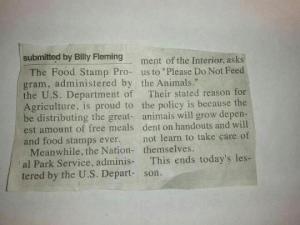finance.townhall.com
It also has very worrisome long-run effects on the stability and viability of a culture, as shown by these two cartoons.
A stark example can be seen in the food stamp program, which has morphed from a handout for the genuinely poor to a widespread entitlement for everyone from college students to the Octo-mom, and for products ranging from luxury coffee to lobster.
When the food stamp program was first expanded nationally in the 1970s, just 1 in 50 Americans participated. Today, 1 in 7 Americans receive $134 each month… With the bipartisan Farm Bill going through Congress right now, these high levels of dependency may become permanent. Some 70 percent of the nearly $1 trillion Farm Bill recently passed by the Senate will be spent on food stamps — that’s $770 billion over ten years. …An estimated 45 million Americans received food stamps in 2011, at a cost of $78 billion. That’s a twofold increase from just five years ago when 26 million people received benefits at a cost of $33 billion. …food stamp enrollment increased and spending doubled, even as unemployment and the poverty level dropped modestly between 2007 and 2011. The more important part of the story comes from the eligibility changes implemented by the Bush and Obama administrations.The last sentence is the key. Eligibility has been expanded dramatically. Food stamps are slowly but surely becoming mainstream and that should worry all of us.
But food stamps are just one form of income redistribution. Welfare spending also is a problem.
Here are some excerpts from a New Hampshire story, featuring a store clerk who got fired because she didn’t think welfare cards should be used to buy cigarettes.
Jackie R. Whiton of Antrim had been a six-year employee at the Big Apple convenience store in Peterborough until a single transaction sent her job up in smoke. The store clerk was fired after she refused to take a customer’s Electronic Balance Transfer card to pay for cigarettes. …Whiton said she did not think EBT cards could be used to purchase cigarettes and refused to sell to him. The two “had a little go-around” as the line got longer behind him, said Whiton. “I made the statement, ‘do you think myself, that lady and that gentlemen should pay for your cigarettes?’ and he responded ‘yes,’ ” Whiton said. …Charles E. Wilkins, the general manager of the C.N. Brown Co. that runs the stores, said the EBT cards in the cash phase could be used for any items, including alcohol, tobacco and gambling. Wilkins said the company gave Whiton the option of staying but she said she would not accept the cards anymore. “She didn’t think it was right and just wasn’t going to sell to people in that program anymore,” Wilkins said. Whiton said when she came to work the next day, her manager asked her how much notice she was giving. When she responded “a week,” she was told the home office had just called and fired her.Ms. Whiton is now one of my personal heroes, joining Mr. Mothershead, another store clerk who had the right reaction when confronted by someone who tried to get something he didn’t earn (albeit using a different tactic).

Last but not least, above is something that arrived in my inbox yesterday.
So, yes, Billy Fleming (assuming he’s real) has a right to be upset.
No comments:
Post a Comment
Note: Only a member of this blog may post a comment.